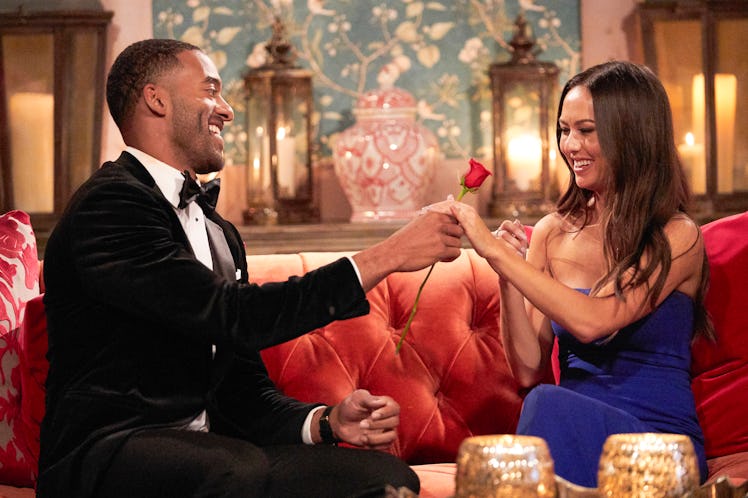
Matt James' First Impression Rose Went To A Woman With A Disability. Finally.
The Jan. 4 premiere of The Bachelor was set to be historic — Matt James is the first Black Bachelor in the franchise’s history. Viewers expected this to be a continuation of the show’s effort to reflect the racial diversity of America, a welcome and much-needed change. But as I sat watching the episode, something else stood out to me, something that I did not expect. As the first evening’s cocktail party came to a close, viewers saw James have a meaningful exchange with Abigail Heringer, a contestant who shared the story of her disability and experience growing up deaf. That would have been enough to feel barrier-breaking to me, but then James gave Heringer the coveted “first impression” rose, an early predictor of a contestant’s longer-term chances with the Bachelor.
Reading this, you may think this lacks meaningful significance because Heringer is beautiful and intelligent, not unlike other contestants. And while you would be right about those things, her disability does indeed matter, just as it matters that James is Black. As someone who was born and lives with a disability, what I saw was representation, a small turn of the tide for a community that is often infantilized and desexualized, now seen on national television in a real-life situation provoking the love interest of someone without a disclosed disability.
Growing up, I had no examples of people who were like me falling in love, attracting the interest of their nondisabled peers. Ableism lives in my brain, co-opting my thoughts about love. Will my chronic illness — my status as a two-time liver transplant recipient — present as too much of a burden to the men I’m interested in dating? How do I make myself more palatable knowing that a partner will be sacrificing something to love someone like me? Heck, will writing this article be the thing that deters a love interest? Because even though I firmly believe there is nothing wrong with having a disability, the world’s inaccessibility and ableism does often make living with a disability harder.
I’m not to blame for my questions about my own chances of finding love, though I am working to free myself from them. Just last year, The New York Times printed a column where an ethicist determined that it was morally acceptable for a woman to dump her partner because she found out about his Crohn’s disease, an inflammatory bowel condition, due to the fact that she would be signing up for a life of “caretaking.” It is this exact narrative that has been shown time and time again in our culture, not to mention the overly perverse interest in how and how often disabled people have sex.
This attitude has real repercussions in the lived experiences of disabled people, even beyond the psychological. Disabled people are less likely to get the sexual health care or education that they need. Doctors miss diagnosing patients’ sexually transmitted diseases because they assume disabled patients aren't sexually active, while these same patients also experience a disproportionate amount of sexual violence.
Of course, Heringer isn’t the first contestant with a disclosed disability. Sarah Herron was a contestant on Sean Lowe’s season of The Bachelor, as well as two seasons of Bachelor in Paradise, and she was born with one arm. More recently, on Tayshia Adam’s season, Zac Clark disclosed his experience with addiction, and Ben Smith told us about his eating disorder — both conditions that are protected and classified as disabilities under the Americans With Disabilities Act. However, what made the Jan. 4 episode unique was the fact that James was not interested in Heringer despite her disability, but because he saw it as an asset, citing her grit and tenacity as qualities he’s looking for in a future partner.
If we see more examples of nondisabled people falling in love with disabled people, maybe we will chip away at the idea that a disability is "baggage" in a relationship. Maybe we'll see it's not unlike or worse than other kinds of "baggage" people bring to relationships. If we see more Lifetime movies like Christmas Ever After — where the lead, played by actor and wheelchair user Ali Stroker, falls in love — maybe my friends who use wheelchairs will feel more confident showing off their chair in dating apps.
Heringer’s opening conversation with James also shows an important model of disclosure, something that disabled people who may have less visible disabilities struggle with in dating, tossing and turning at night trying to decide when is the appropriate time to tell a romantic interest about their disability and how to approach that conversation. In this instance, Heringer decided to be up front and let James know immediately upon meeting him, perhaps because it could impact the way they communicate, or simply because she feels it’s something important for people to know. Even if that’s reportedly not how she normally approaches her disability, the confidence she embodied while telling James helps shatter the stigma of disability that still looms large.
It’s moments like these that make me really excited to see Heringer’s journey this season. It’s my hope that her experience opens up more conversations about disability and dating in a way that is based in real life experience, in a way that continues to educate us all, and opens up more opportunities for disabled people to thrive.